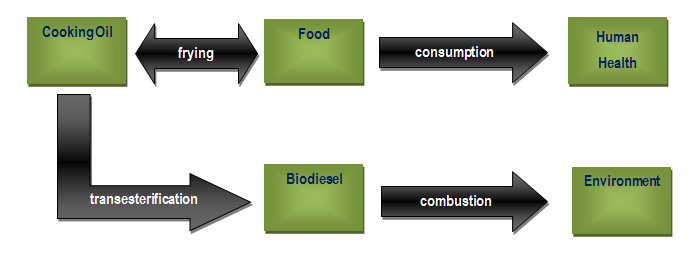The Bioenergy and Human Health Link
This research aims to correlate bioenergy and human health, through the study of frying process of frozen pre-fried potatoes in sunflower oil, which will be subsequently used as a raw material for biodiesel production.
The depletion of fossil fuel reserves, especially oil, and the environmental impact of emissions from fuel combustion led the scientific community to focus on sustainability and to search for alternative renewable forms of energy. At the same time, discussion is raised on the importance of diet for human health which is related to serious diseases such as CHD (Coronary Heart Disease) and CVA (Cerebral Vascular Accident).
This study investigates the process of biodiesel production through based-catalysed transesterification. The study also examines deep frying of frozen pre-fried potatoes with sunflower oil, which is a common practice in fast food restaurants. However, the main idea of this research can be applied to other types of frying, foods and vegetable oils.
The originality of this study is the correlation of the quality of the raw material for biodiesel production, and in particular waste sunflower oil, and the way it affects the quantity of the based catalyzed in biodiesel production and human health after consumption of fried food.
This is achieved by measuring the change of the percentage composition in FFA (Free Fatty Acids) and FA (Fatty Acids) in vegetable oil, and the calculation of the total catalyst cost, in relation to the number of frying cycles, for up to 75 frying cycles.
The main findings of this research are the equation of the change of the percentage mass composition in FFA, SFA (Saturated Fatty Acids) and PUFA (Polyunsaturated Fatty Acids), of sunflower oil as a function of the number of frying cycles. In addition, with the use of the same sunflower oil in up to 23 cycles of deep frying of frozen pre-fried potatoes at 190 °C, the FFA composition of sunflower oil after frying does not exceed 0.5%. No additional catalyst is required for biodiesel production. SFA do not exceed 14.4%, whereas the PUFA remain at a relatively high percentage (57.1%), of total FA, thus decreasing the LDL (Low Density Lipoprotein) cholesterol concentration and the risk of CHD and CVA. Finally, the equations for the calculation of the quantity of the catalyst required for biodiesel production, provided by Van Gerpen et al., for oils with a FFA composition over 0.5%, which are in relation to mass percentage of FFA, have been converted in relation to the number of frying cycles.
